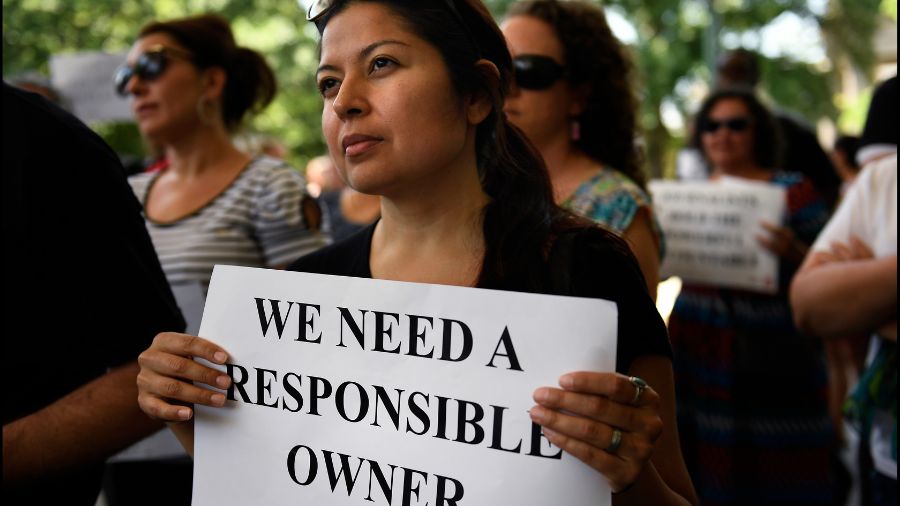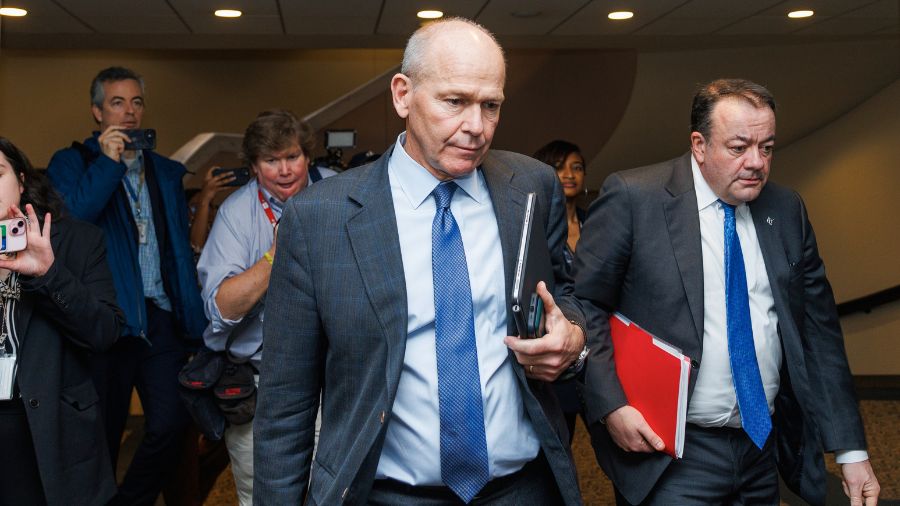Seattle council: Amazon is making head tax all about them
May 3, 2018, 5:45 AM | Updated: May 8, 2018, 10:34 am

A flier calling on Seattle to "tax Amazon" bears the seal of Seattle and Councilmember Kshama Sawant's name. The flier promotes an anti-Amazon protests in April 2018. (Dyer Oxley, MyNorthwest)
(Dyer Oxley, MyNorthwest)
Hours after news broke that Amazon was halting construction on its expanding Seattle headquarters over a proposed head tax, the Seattle City Council reacted.
RELATED: Amazon halting Seattle HQ construction over head tax proposal
“This was never a proposal targeting one company, but Amazon made the conversation about them when they expressed their intentions to pause construction on their new office tower pending a vote on our Progressive Tax on Business,” the council said in a statement.
The statement is attributed to council members Lorena González, Lisa Herbold, Teresa Mosqueda, and Mike O’Brien. They say $75 million would be generated through the proposed head tax from approximately 585 of the largest companies in the city. And they point out that Amazon produced “record-breaking profits of nearly $2 billion in one quarter.”
“We estimate that under our plan, Amazon would pay about $20 million annually toward this new tax,” the council members said.
The council members argue that the city’s homelessness and affordability crises outweigh Amazon’s profits. They blame Washington’s “upside-down” tax code that does not provide the city enough money to tackle the problems — while taxing the wealthy very little compared to low-income and middle-class residents. They also say that Seattle’s tax system is the most regressive in the state.
Read the council members’ full statement below. Councilmembers Kshama Sawant, Sally Bagshaw, Rob Johnson, Debora Juarez, and Bruce Harrell did not sign the statement.
Kshama Sawant
While the council members state that it is Amazon who is making the head tax conversation about them, they may want to check in with their council colleague Kshama Sawant. She has championed the tax as an “Amazon tax.”
In fact, Sawant passed around an online petition following Wednesday’s news which refers to the head tax an “Amazon tax” stating: “Amazon’s threat to halt construction on a project in Seattle that would employ 7,000 people, in protest of the proposed EHT (Amazon Tax) in Seattle City Council, constitutes nothing less than extortion.”
The petition, like similar statements made by Sawant in the past, states that Amazon’s recent move is a “bluff.”
Sawant has also held public events against Amazon to garner support for the head tax. On April 10, 2018 protest was held outside the Amazon spheres in South Lake Union. That event promoted the head tax as a means to fund affordable housing.
Mike O’Brien on Amazon
Councilmember Mike O’Brien also spoke at a community meeting in Ballard Wednesday night. He said he is open to dialogue with Amazon. In fact, he spoke with company representatives Wednesday morning. O’Brien said that he and the online retailer agree that Seattle needs more affordable housing and that homelessness is a crisis.
“Amazon clearly would prefer not to pay the tax, I get that,” O’Brien said. “We care about Amazon as a corporate citizen, but we also care about folks who are struggling right now. When you look at the profits for Amazon last quarter and the challenges we face as a community, I need to raise more money for affordable housing and I’m not going to put it on the backs of the lowest income people in our community.”
O’Brien said that he is addressing poverty in the community that wasn’t present in Seattle 10 years ago and that this is a problem that many tech hubs are dealing with. He said that Amazon is not in Seattle because it is a cheap place to do business, rather, it’s where people want to work.
City council members’ statement
Councilmembers M. Lorena González, Lisa Herbold, Teresa Mosqueda and Mike O’Brien issued the following statement in response to the “construction pause” announced earlier today:
Collectively we – the primary sponsors of the business tax currently being discussed in Council – represent 750,000 people who call Seattle home.
Under our plan, called the Progressive Tax on Business, $75 million would be generated annually from approximately 585 of the City’s largest businesses, with three-quarters of that going toward additional affordable housing.
This was never a proposal targeting one company, but Amazon made the conversation about them when they expressed their intentions to pause construction on their new office tower pending a vote on our Progressive Tax on Business.
The company recently reported record-breaking profits of nearly $2 billion dollars in one quarter.
We estimate that under our plan, Amazon would pay about $20 million annually toward this new tax.
The lack of affordable housing is a crisis for our entire community. We simply don’t have the revenue necessary to fill the gap. Why? In large part it’s thanks to Washington’s upside-down tax code that puts an inequitable accumulation of wealth ahead of the needs of everyday people. This is what leads to greater and greater income disparity. Not only does Washington State have the most regressive tax structure in the nation, but Seattle’s taxation is the most regressive in the state. The cost of providing services to a City that has grown by 100,000 people in the last 10 years, in a region that continues to grow by 1,000 people a week, is vastly outpacing our revenue in this booming economy.
Seattle has become the nation’s biggest company town. We’ve shifted to a service-based economy; only a handful of services are taxed, and they are virtually all provided by blue-collar workers. Washington State doesn’t tax income or capital gains, and at the city level, we’re left with very few options to raise the resources we need.
Our charter requires us, as elected officials – as a city, to protect and enhance the general welfare of people. We’ve added hundreds of new shelter spaces in the last couple years and moved more than 3,000 people out of homelessness and into permanent housing just last year, yet more than 3,800 people sleep outside in Seattle every night. Thousands more compete for shelter and temporary housing. We have an opportunity to treat Seattle residents humanely and with dignity.
Many employees of large businesses in Seattle are paid so little that their families qualify for state-funded Medicaid. Whether it’s Amazon (~1,100 employees across Washington – costing the state over $7.5 million per year,) McDonalds (~3,900 WA employees costing $17 million per year) or Home Depot (~1,200 WA employees costing $7.4 million per year), big business often leaves many people behind and expects taxpayers to pick up the bill.
While Amazon didn’t single-handedly cause this problem, they have contributed to the growing income inequality, displacement and housing affordability issues facing our City. That is precisely why — in their visits with 20 other cities — Amazon has sought to speak with elected officials about plans to proactively address those consequences. It seems only fair that as so many struggle to make their way through a tax system that’s rigged in favor of large corporations, that we ask those same corporations to financially contribute to the public health and housing solutions designed to address those consequences.
Greater shared responsibility equals greater shared prosperity for all, businesses and residents alike.
Follow @http://twitter.com/Mynorthwest













